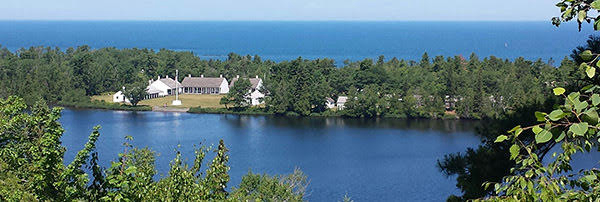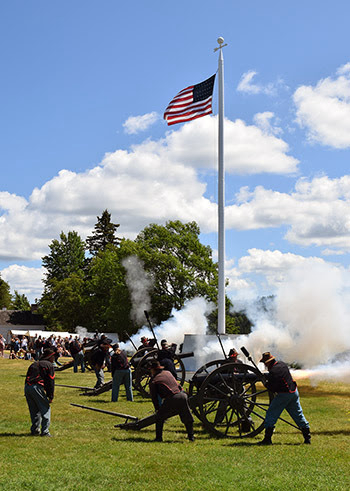Michigan: Fort Wilkins Celebrates 100 Years As A State Park

A visit to Fort Wilkins is a treat in itself, but the weekend of July 28-30 offers even more – an encampment with the Civil War living-history group Battery D, 1st Michigan Light Artillery, featuring 25-plus costumed interpreters, a depiction of army barracks life and soldiers’ pastimes, full-scale cannon, and authentically reproduced clothing, tools and weapons.
It’s an annual tradition that was paused during the COVID pandemic. Battery D’s return coincides with Fort Wilkins Historic State Park’s 100th anniversary.
“In 1923, Fort Wilkins became a state park, and today the site includes camping, picnicking, fishing and other recreation opportunities as well as this wonderfully preserved historic site,” said Barry James, Upper Peninsula historian for the Michigan History Center.
“You’ll hear the echo of cannon fire rolling down the length of Lake Fanny Hooe, just as soldiers heard it more than 175 years ago. It is an experience not to be missed!”
- The encampment is open to park visitors 8 a.m. to dusk Friday and Saturday, July 28 and 29, and 8 a.m. to 4 p.m. Sunday, July 30.
- Demonstrations, including Civil War medical and undertaking procedures, drills and skits are featured throughout the weekend.
- For the daily schedule of activities, call 906-289-4215.
About Fort Wilkins
The U.S. Army built Fort Wilkins in Copper Harbor, at the tip of the Keweenaw Peninsula, in 1844. The fort kept the peace during Michigan’s copper rush before being abandoned in 1846. The Army regarrisoned the fort between 1867 and 1870. It remains a well-preserved example of a mid-1800s fort, and includes officers quarters, soldiers barracks, married enlisted men’s quarters, hospital, workshops, powder magazine and guardhouse.
Everyday life at Fort Wilkins comes alive all summer long as costumed interpreters portray men and women stationed there during the summer of 1870. Modeled after actual members of the army garrison and based on extensive historical research, costumed interpreters are on duty throughout the fort 10 a.m. to 5 p.m. daily through Aug. 18.
The role-playing program is supplemented by four three-day living-history camps presented by the Future Historians, a youth program of the Michigan Iron Industry Museum in Negaunee. Youth train each spring to portray children at Fort Wilkins during the camps. This summer, 35 participants will demonstrate children’s games and chores and tell visitors about growing up in 1870 over three weekends: July 25-27, Aug. 2-4 and Aug. 16-18.





